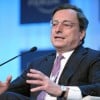Sorry, no content matched your criteria.
Featured Story
What Today's ECB Decision to Cut Rates Means for Investors

The European Central Bank announced a number of monetary policy changes Thursday in attempts to spur anemic growth and fend off slack inflation.
Disappointed investors sent stocks lower in early trading.
The European Central Bank announced a number of monetary policy changes Thursday in attempts to spur anemic growth and fend off slack inflation.
Disappointed investors sent stocks lower in early trading.
